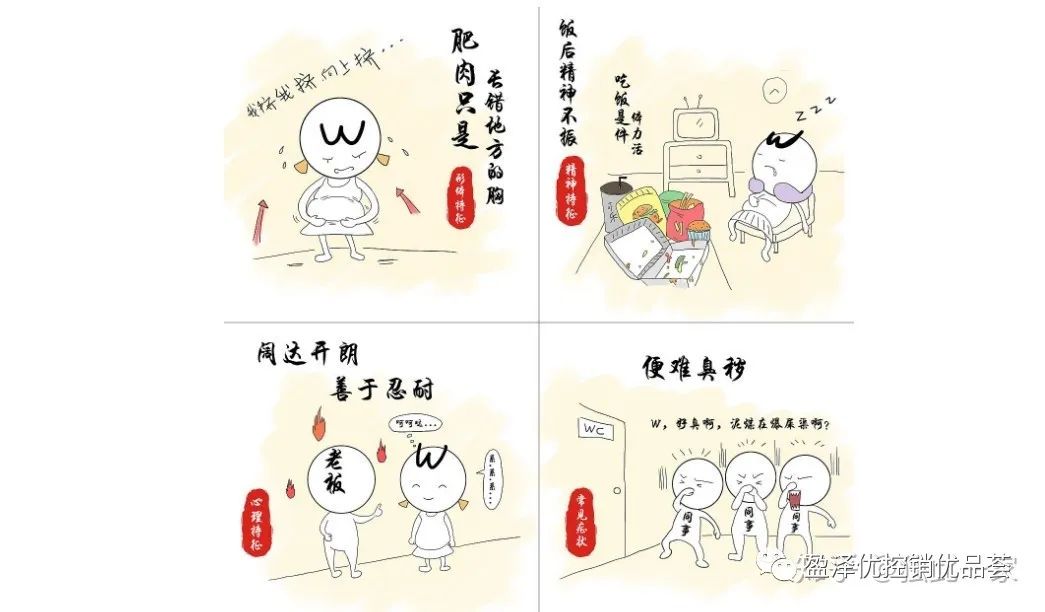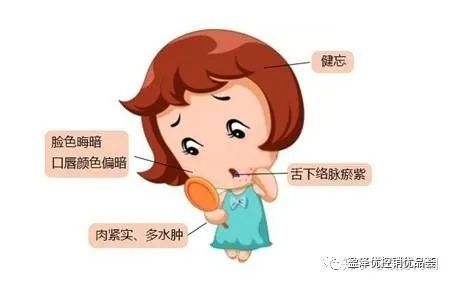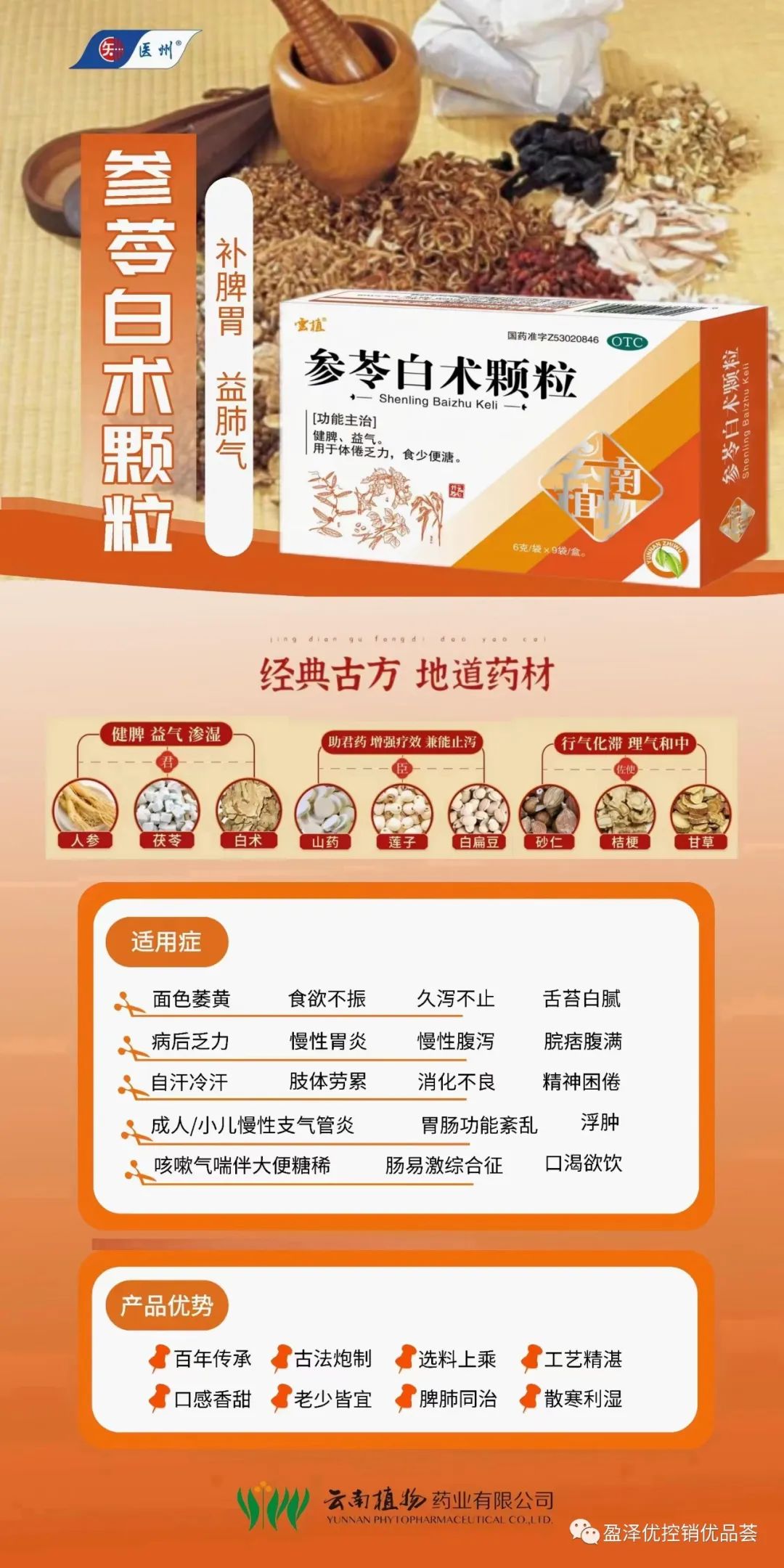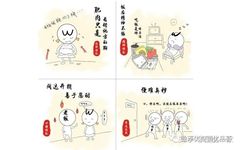In Traditional Chinese Medicine (TCM), there is a saying that phlegm originates from the pí (spleen), comes from the gān (liver), is rooted in the shèn (kidney), and is stored in the fèi (lungs). Many people often have some phlegm in their throats; some cough up a lot, while others feel the need to clear their throats throughout the day, and the phlegm seems never-ending…
Phlegm originates from the spleen. We all know that the main function of the spleen is to transform and transport the essence of food and fluids. If the spleen is deficient, it will be unable to perform this function, leading to the accumulation of fluids and dampness, which eventually transforms into phlegm. Typically, individuals with this condition may experience symptoms such as heaviness in the limbs, poor appetite, and unformed stools. Upon examination, the tongue appears swollen with indentations and a thick, greasy coating. In such cases, we can refer to Píng Wèi Wán (Ping Wei Pill) to strengthen the spleen and dry dampness. If phlegm has already formed, we can combine it with Yī Wù Èr Chén Wán (Er Chen Pill) and Shēn Lín Bái Zhú Kē Lì (Shen Ling Bai Zhu Granules) to not only strengthen the spleen and dry dampness but also resolve phlegm.
Phlegm comes from the liver. In TCM, it is said that the liver belongs to wood and the spleen belongs to earth; wood overcomes earth. When liver function is impaired, the spleen is the first to be affected. Once the spleen is compromised, dampness and phlegm will form in the body. Therefore, phlegm also originates from the liver. Individuals with this condition often experience not only phlegm due to spleen deficiency but also have a tendency to be irritable and easily angered, especially when anger leads to pain in the sides and loss of appetite. In this case, we need to strengthen the spleen and dry dampness while also soothing the liver and relieving stagnation. We can use Píng Wèi Wán in combination with Xiāo Yáo Wán (Xiao Yao Pill) to achieve both liver soothing and spleen strengthening effects.
Phlegm is rooted in the kidney. TCM believes that the metabolism of fluids is also related to the kidneys. When the functions of the lungs and spleen are obstructed, it can lead to kidney qi deficiency, which affects the distribution of fluids, causing them to accumulate and form phlegm. Therefore, phlegm is rooted in the kidneys. In this case, we can use Píng Wèi Wán combined with Jīn Kuí Shèn Qì Wán (Jin Kui Shen Qi Pill) to warm yang, promote fluid metabolism, and resolve kidney phlegm.
Phlegm is stored in the lungs. When the lungs are deficient, it becomes difficult to regulate the flow of qi, leading to the accumulation of dampness and phlegm, which obstructs the lung’s qi mechanism. This can result in the lungs storing a large amount of phlegm and fluids, causing a deficiency of righteous qi, allowing external pathogens to invade. If these pathogens linger, they can lead to coughing and phlegm production. If you frequently cough up yellow phlegm, you can use Píng Wèi Wán combined with Xiān Zhú Lì (Fresh Bamboo Juice) for treatment. If the phlegm is primarily white, you can combine it with Huà Jú Hóng Kē Lì (Hua Ju Hong Granules).
For individuals with a phlegm-damp constitution: This is also known as a cold and damp constitution, often caused by improper diet or illness. Here, ‘phlegm’ does not merely refer to the common understanding of phlegm but rather to the abnormal accumulation of body fluids, which is a pathological product. The phlegm-damp constitution is currently a common type of constitution. When the body’s organs, yin and yang, and the movement of qi, blood, and fluids are imbalanced, it is easy to form phlegm and dampness, indicating a phlegm-damp constitution.

Characteristics of the Constitution
Individuals with this constitution tend to be overweight, have a preference for rich and fatty foods, feel fatigued, are lazy to move, tend to be sleepy, feel heavy in the body, have a sticky mouth or loose stools, a slippery pulse, a swollen tongue, and a greasy coating. If ill, they may experience chest and abdominal fullness, cough with excessive phlegm; or have a poor appetite, nausea, vomiting, and loose stools; or experience swelling in the limbs, with indentations upon pressure, and difficulty or cloudy urination; or feel heavy and fatigued in the head and body, with joint pain and numbness; or women may have excessive vaginal discharge.

Regulation Methods
-
Herbal Regulation: The formation of phlegm-dampness is closely related to the lungs, spleen, and kidneys, so the focus should be on tonifying these three organs. If phlegm is formed due to the lungs failing to disperse and transport fluids, we should promote lung function and resolve phlegm, using Èr Chén Tāng (Er Chen Decoction). If phlegm is due to spleen deficiency and dampness accumulation, we should strengthen the spleen and resolve phlegm, using Liù Jū Zǐ Tāng (Liu Jun Zi Decoction) or Xiāng Shā Liù Jūn Zǐ Tāng (Xiang Sha Liu Jun Zi Decoction). If kidney deficiency leads to an inability to control water, resulting in phlegm, we should warm yang and resolve phlegm, using Jīn Kuì Shèn Qì Wán. Additionally, we can use medicinal pastes or TCM patent medicines for regulation, such as Chú Shī Gāo (Dampness-Removing Paste) and Qù Shī Kē Lì (Dampness-Removing Granules).
-

-
Acupuncture Regulation: According to traditional TCM theory, individuals with a phlegm-damp constitution often also exhibit characteristics of spleen deficiency with damp obstruction, stomach heat with damp obstruction, liver qi stagnation, and deficiency of both spleen and kidney. Our clinic employs methods such as electro-acupuncture, guasha, and auricular acupressure for differential treatment, achieving good clinical results.
After this COVID-19 infection, coughing is often caused by spleen qi deficiency, prolonged coughing damaging the lungs, or invasion by external pathogens such as cold and dampness. When external pathogens invade the lungs, lung function becomes abnormal, leading to the stagnation of fluids and the formation of phlegm; spleen qi deficiency disrupts the distribution of fluids, causing dampness to accumulate as phlegm, which is stored in the lungs; or prolonged coughing damages the lungs, weakening their ability to distribute fluids, leading to dampness accumulation. All three of these causes can lead to phlegm obstructing the lungs, causing lung qi to rebel, resulting in coughing with excessive phlegm, which is white, thin, and easy to expectorate. Phlegm obstructs the airways, causing lung qi stagnation, leading to chest tightness and, in severe cases, wheezing with phlegm. The tongue is pale with a greasy white coating, and the pulse is slippery, indicating internal obstruction of phlegm-dampness.

Symptoms: Coughing with excessive phlegm, which is white and thin and easy to expectorate, chest fullness and tightness, coughing worsens with movement, wheezing with phlegm, tongue coating is white and greasy or white and slippery, pulse is slippery and weak. Treatment principle: Tonify the lungs and strengthen the spleen, dry dampness and resolve phlegm. Main formulas: Liù Jūn Zǐ Tāng (Liu Jun Zi Decoction), Èr Chén Tāng (Er Chen Decoction).
“Support the righteous qi, assist recovery; prevent recurrence, avoid re-infection. When the righteous qi is preserved within, evil cannot invade!”
Clinical feedback from Yun Zhi: Qù Shī Kē Lì combined with Shēn Lín Bái Zhú Kē Lì can effectively shorten the duration of coughing and restore appetite. The suggested plan can be adjusted based on clinical symptoms!

